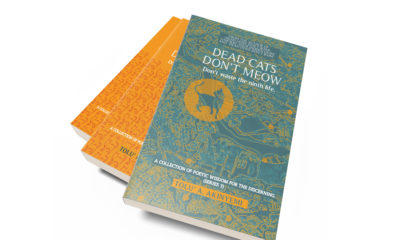Features
HaroldWrites: Should Literary Awards Be Subjected to Public Votes?
 If you are an active citizen of the Nigerian literati space, I believe you would have heard of the Flash Fiction Prize/Award currently run by one of Nigeria’s major telecommunication giants. The Prize/Award is open to all writers of unpublished short stories of not more than 300 words and it is open to writers of African citizenship, irrespective of where they reside in the world. The Prize is in its 3rd year now. This Flash Fiction Prize/Award is commendable in what it proposes to achieve, but at the same time, its methodology for picking a winner is one of the weirdest in the class of literary awards around.
If you are an active citizen of the Nigerian literati space, I believe you would have heard of the Flash Fiction Prize/Award currently run by one of Nigeria’s major telecommunication giants. The Prize/Award is open to all writers of unpublished short stories of not more than 300 words and it is open to writers of African citizenship, irrespective of where they reside in the world. The Prize is in its 3rd year now. This Flash Fiction Prize/Award is commendable in what it proposes to achieve, but at the same time, its methodology for picking a winner is one of the weirdest in the class of literary awards around.
When I first heard of the Award in 2014, I thought it was something I would enjoy partaking in. I mean, which budding writer wouldn’t want to have a literary award to his name? I could not enter for the 2014 edition, but I did enter for that of 2015. Unfortunately, I did not get a feedback that my entry was approved. Interestingly, a year after the award was completed and Prizes given, I got an email saying my “entry has been approved.” There were obviously technological hitches with their system, thus resulting in belated attendance to my entry. This was the first warning sign about this Award.
Now in 2016, I got another opportunity to enter for the award. I submitted my entry without any issues. Remember what I said about how this Prize/Award set-up is one of the weirdest around? We all know how some of the world’s most prestigious literary awards are being determined by renowned and accomplished literary experts as Judges. This isn’t exactly the case with this Prize/Award. To win this Prize, you must first go through the hurdle of getting the general public to vote your story on their dedicated site. The most popularly voted stories then get picked up by their Judges who, in turn, pick the winner. So, if you are not able to get as many votes for your entry, then, there is no hope of you winning the Award – no matter how award-worthy your story might be.
In the light of the aforementioned hurdle, you can imagine the type of habits participants engage in, just in a bid to get the public to vote their stories. Apart from literally begging friends and family members to go vote their story, some participants have developed other ingenious ways to get votes. Now, I don’t particularly enjoy going on social media to beg for votes. I interpret this as bugging others just for your selfish gain. And nobody likes to be bugged. Again, I think subjecting participants to go solicit votes in such manner demeans the award in a certain type of way. Literary awards should be prestigious and solemn events, and not popularity contests.
So rather than bug people on social media, I decided to try one ingenious way to test the system. So, I set up a two-day Facebook Ad on my Page (this is asides putting a link on my Twitter, Instagram and BBM accounts). To my amazement, the Ad pulled some interesting algorithms: by the end of the second day, the ad had reached 1,418 people with 138 of those people “liking” the ad.
With the foregoing stats, you would expect that, at least no fewer than 100 of those people would go over to the dedicated site to vote my entry. Well, I was in for a treat when I checked my story. It had just six votes. Six solid votes.
The point must be reiterated that, I ran the Facebook Ad to test the system. The test was to determine if people would vote my story because they liked it and thought it was deserving of the award (as it ordinarily ought to be), or they would vote it just because I asked them to. From the stats result I got, it might be difficult to reach a verdict for this singular reason: I got a lot of feedbacks from people who tried accessing the site, but couldn’t because the site kept giving an “error” pop-up. The site developers created the site in such a way that, one can only access it from a laptop or a few special mobile browsers like Firefox.
The foregoing then begs the question: to what end does opening literary awards for public votes serve? In defence of the organizers of this award, I think their reason for adopting this approach is to help downsize the number of stories that will be reviewed and eventually picked by the Judges. On face value, this sounds like a valid reason, but when one considers the fact that, the best entry might not make it due to lack of sufficient public votes, can one still say determining literary awards by public votes still serves any utilitarian value?
In your opinion, should literary awards be subjected to public votes?
Photo Credit: Michael Gray | Dreamstime.com

























